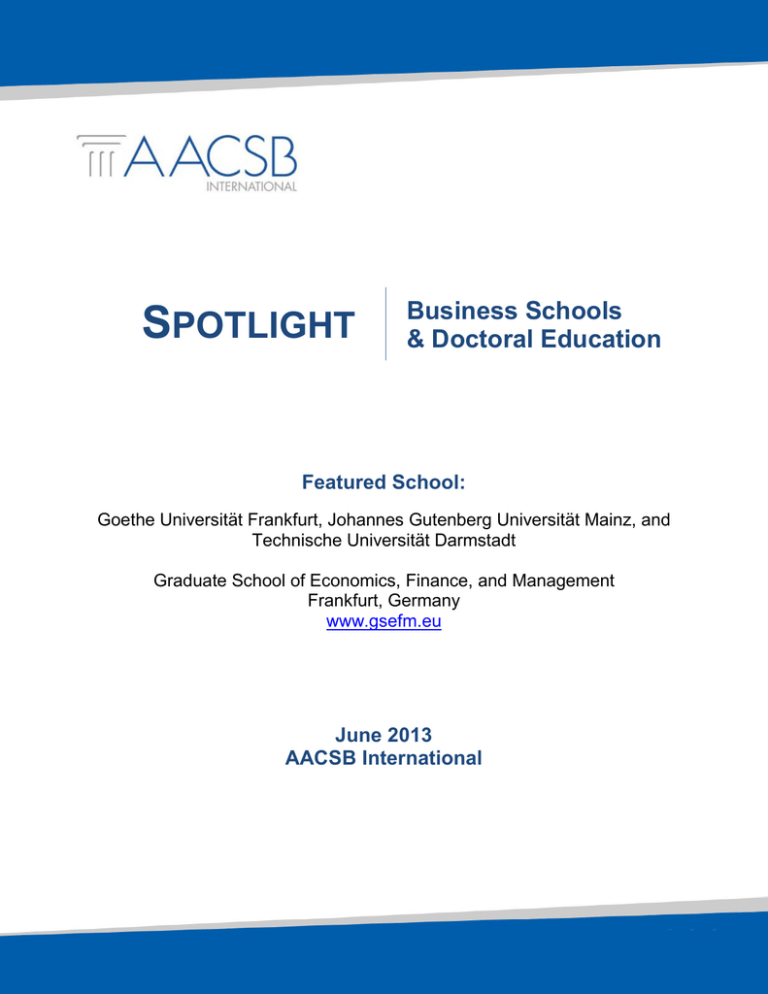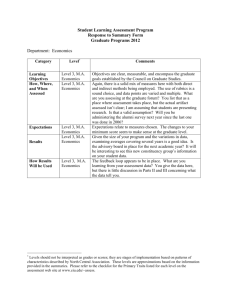
SPOTLIGHT
Business Schools
& Doctoral Education
Featured School:
Goethe Universität Frankfurt, Johannes Gutenberg Universität Mainz, and
Technische Universität Darmstadt
Graduate School of Economics, Finance, and Management
Frankfurt, Germany
www.gsefm.eu
June 2013
AACSB International
SPOTLIGHT | Business Schools & Doctoral Education Graduate School of Economics, Finance, and Management | 2
Graduate School of Economics, Finance, and Management
The Graduate School of Economics, Finance, and Management (GSEFM) is a graduate
school with an interdisciplinary focus offering doctoral and research-oriented master
programs, created through a collaboration between Goethe Universität Frankfurt,
Johannes Gutenberg Universität Mainz, and Technische Universität Darmstadt. 1
According to the GSEFM's Dean Michael Binder, it was established to create an AngloSaxon style of doctoral program delivery within Germany, something which he felt was
sorely missing in the country.
"We had noticed that many aspiring doctoral students in
Germany took a similar path - leaving for the United
States and enrolling in one of the premier PhD programs
there," says Dean Binder. "This brain drain, as well as
the lack of recruitment of high-caliber international
doctoral students, was a significant obstacle in moving
our faculty forward."
To rectify this, in came the GSEFM. The GSEFM offers doctoral education in the fields
of economics, law, and business administration, with research centered around
institutions (their design, preferences, behavior, and interactions) and an
interdisciplinary approach. The five PhD programs are complemented by five
corresponding, research-oriented Master Programs in Quantitative Economics,
Quantitative Finance, Quantitative Economics and Law, Quantitative Management as
well as Quantitative Marketing, collectively called MSQ Programs. 2 The vision of the
GSEFM is to establish the premier center in Europe for research-oriented doctoral
education.
FORMATION
Dean Binder says Johannes Gutenberg Universität Mainz and
Technische Universität Darmstadt are not just in close
geographic proximity to Frankfurt, but bring specific areas of
expertise to the collaboration with Goethe Universität
Frankfurt. Darmstadt is particularly well known for its strength
in engineering and the sciences at large, and it is one of the
German institutions with the strongest focus on the pursuit of
technology, 3 according to Dean Binder. Similarly, Mainz has
a number of accomplishments, also related to the sciences,
but also carries a strong focus on the humanities. 4 For both
Darmstadt and Mainz, however, their economics and
business administration departments were not very large
and had been unable to draw sufficient support to offer their
own PhD programs. As both schools had an interest in
developing a PhD in the area of economics, the
© AACSB International. All Rights Reserved.
SPOTLIGHT | Business Schools & Doctoral Education Graduate School of Economics, Finance, and Management | 3
conversation began of a collaborative effort with Goethe
Universität. Dean Binder explained that while Goethe
Universität had been able to offer the PhD program in
economics on its own since that program's launch in 2004,
expanding to five separate doctoral programs with in-depth
second-year coursework was facilitated by the assistance of
Darmstadt and Mainz. The three universities agreed that the
courses would all be held on Goethe Universität's campus in Frankfurt, to ensure that
students did not lose time traveling between campuses, potentially disrupting the
interactivity of the programs. 5
Initial funding for the GSEFM came through the three faculties at the participating
universities, with Goethe Universität additionally offering the facilities. For financing, the
GSEFM currently utilizes a variety of sources. The states of Hessen and RhinelandPalatinate provide funding for a significant fraction of the full-time faculty members, who
in turn can typically support up to four doctoral students for both teaching and research.
Other funding from the public sector is also available, for example through the German
Research Foundation that provides funding to research schools in Germany, and
through the LOEWE initiative of the state of Hessen supporting the development of
scientific and economic excellence in Hessen. 6 Finally, the GSEFM has received
funding from the private sector through such organizations as CITI Foundation and
various European banks and financial services companies, such as Axa Private Equity,
ING-DiBa, and SEB Asset Management.
Beginning in Fall 2011, the GSEFM incorporated five PhD programs in economics,
finance, law and economics, management, and marketing. The programs were
designed to mirror the structure of the PhD program in economics that had previously
been offered by Goethe Universität. The GSEFM offers a two-year cycle of courses for
students arriving with a bachelor degree, with a fast-track option of only one year of
course work for students arriving with a quantitative master's degree. 7
Dean Binder considers the GSEFM doctoral programs similar in their design to top
economics PhD programs in the United States. The GSEFM takes special care to
create an easy transition from the course phase into the dissertation-writing phase.
They do this through a focus on both research and presentation skills during the
second-year coursework, as well as seminars designed to jumpstart dissertation
research during the first year of the writing phase.
PROGRAM DETAILS
Admission into the program is determined based upon several factors. Students must
demonstrate strong quantitative skills. This is shown through submission of a
comprehensive application dossier, including transcripts, test score results, and letters
of motivation. Students may apply from outside of the GSEFM disciplines, but must
include a convincing reason for switching into the field. Additionally, students must
supply letters of recommendation from previous faculty. They must at a minimum have
© AACSB International. All Rights Reserved.
SPOTLIGHT | Business Schools & Doctoral Education Graduate School of Economics, Finance, and Management | 4
a bachelor's degree. Currently, the GSEFM has a wide mixture of applicants, some with
a completed bachelor's, and some who have completed a master’s degree. The current
student intake is largely international, with approximately fifty percent of the student
body being from outside of Germany. Dean Binder believes that having this international
mixture creates a more stimulating learning and research environment. With such a high
percentage of non-German students, the GSEFM takes special care to ease their
transition into life in Frankfurt. The GSEFM assists with visa issues, provides guidance
and advice for housing and health insurance issues, and offers an extensive orientation
phase to help students acclimate to Frankfurt. 8
Degrees are conferred from GSEFM jointly between the three partner universities. The
three universities have a common set of rules and policies, allowing a student deemed
worthy of the degree from the GSEFM to be granted it across the three partnering
universities.
The GSEFM does not offer a part-time option for coursework. The belief held by the
faculty of the GSEFM is that it is important to catch up with the research frontier with
limited interruption. By offering the program in a full-time format, students must dedicate
themselves wholly to their coursework, which, in the opinion of Dean Binder, creates a
better learning environment. However, students are on occasion permitted to take brief
breaks from the program, to take part in professional internships related to their areas of
research.
"We have a number of students who take two to three months leave to do internships at
policy institutions or banks. One of our strategic advantages is that Frankfurt is home to
two central banks (the European Central Bank and the Deutsche Bundesbank), so our
students get more opportunities for internships than in many other locations. We advise
students to stay within the program during the dissertation stage but if someone would
like to combine thesis work with a part-time and/or research-oriented professional
position, that can work out as well if it is after completion of the coursework," Dean
Binder says of GSEFM students.
INTERDISCIPLINARY
The GSEFM focuses on creating an interdisciplinary research environment. "A graduate
school's interdisciplinary nature depends upon the level of interaction between the
programs," says Dean Binder. All students, across all five programs, take part in the
mathematics, econometrics and microeconomics courses of the first year in the
program. Students there will gain a thorough understanding of the behavioral foundation
of decision making by households, firms, and policy institutions. They also acquire the
requisite skills to handle data and analyze it thoroughly. The GSEFM aims to ensure
that all students have a common, research-level understanding of these topics.
Yet, beyond this first year coursework, the GSEFM boasts interaction between law and
economics, as well as law and business administration. The GSEFM goes outside of
the traditional standards and merges the more qualitative aspects of law with the
© AACSB International. All Rights Reserved.
SPOTLIGHT | Business Schools & Doctoral Education Graduate School of Economics, Finance, and Management | 5
intensive, quantitative aspects of
business administration and economics.
This is notable via faculty collaborations,
merged curricular offerings, and projects
involving both law and business students.
Additionally, the GSEFM has a host of
individual faculty members who branch
out beyond traditional boundaries and
The GSEFM's primary facility.
work with faculty in fields such as history,
geography and computer science. And,
while there is no formal joint degree program where a student might substitute, say, a
geography course for a business course, there is a very present level of interactivity
between these areas within the partnership.
One notable means for promoting interdisciplinary research and collaboration at the
GSEFM is through the required dissertation. The GSEFM dissertation takes the form of
a collection of multiple papers, as opposed to one, large single document (which used
to be the standard in Germany). Students are asked to think early about placing these
papers into journals. While having the papers published is not a requirement, the
GSEFM finds that getting their student’s work published earlier helps the students to
produce research suitable for presentations at international conferences and to attract
attention on the academic job market. Students are encouraged to collaborate with coauthors from different disciplines, including both other students and faculty members. A
student could produce one paper in finance on their own, while co-authoring a paper in
economics and law, working collaboratively with a law student.
PLACEMENT
Dean Binder notes that the single most important factor for the GSEFM is the placement
record of its graduates. "Placement is also a good measure of how strong the research
is, and the papers being produced. We aspire to be amongst the top institutions in
Europe in terms of placement," he says. About fifty percent of the GSEFM's graduates
go into academia. GSEFM, despite being a young school, has had graduates hired for
junior faculty positions at Oxford, Cambridge, Columbia, INSEAD, Oxford, Xiamen, and
other top universities around the world. About thirty percent of graduates have gone on
to jobs in research-focused policy institutions, including the European Central Bank,
Federal Reserve, and IMF. And finally, about twenty percent of graduates go on to
careers in the private sector, typically within the financial industry, into roles such as
analysts, consultants, and other positions.
Acknowledgements: AACSB International is grateful for the assistance of Michael Binder, PhD, Dean of
the Graduate School of Economics, Finance, and Management and Professor of Economics at Goethe
Universität Frankfurt.
© AACSB International. All Rights Reserved.
SPOTLIGHT | Business Schools & Doctoral Education Graduate School of Economics, Finance, and Management | 6
End Notes
1
Graduate School of Economics Finance and Management (2013). Founding Universities webpage,
http://gsefm.eu/gsefm-an-introduction/founding-universities.html, accessed on May 8, 2013
2
Graduate School of Economics Finance and Management (2013). GSEFM Degree Programs webpage,
http://gsefm.eu/gsefm-degree-programs.html, accessed on May 9, 2013
3
Graduate School of Economics Finance and Management (2013). Founding Universities
webpage,http://gsefm.eu/gsefm-an-introduction/founding-universities/technische-universitaet-darmstadt.html,
accessed on May 8, 2013
4
Graduate School of Economics Finance and Management (2013). Founding Universities webpage,
http://gsefm.eu/gsefm-an-introduction/founding-universities/johannes-gutenberg-university-mainz.html,
accessed on May 13, 2013
5
Graduate School of Economics Finance and Management (2013). Founding Universities webpage,
http://gsefm.eu/, accessed on May 13, 2013
6
Graduate School of Economics Finance and Management (2013). Founding Universities webpage,
http://www.excellence-initiative.com/, accessed on May 8, 2013
7
Graduate School of Economics Finance and Management (2013). Founding Universities webpage,
http://gsefm.eu/gsefm-degree-programs.html, accessed on May 9, 2013
8
Graduate School of Economics Finance and Management (2013). Founding Universities webpage,
http://gsefm.eu/gsefm-an-introduction/key-features-of-gsefm.html, accessed on May 8, 2013
© AACSB International. All Rights Reserved.





